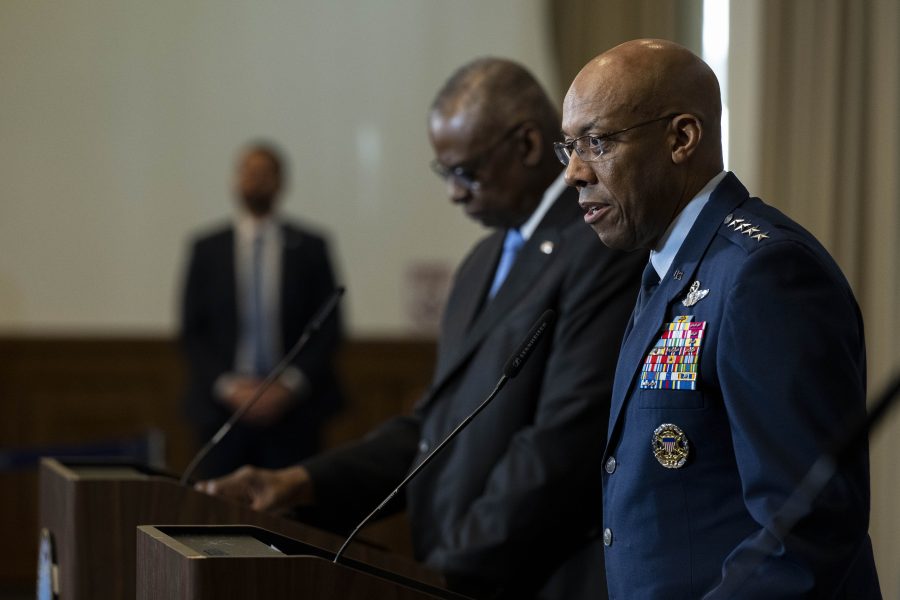Gen. Charles Q. Brown Jr. may have moved on from Air Force Chief of Staff to Chairman of the Joint Chiefs, but he is keeping an eye on the Air Force’s effort to “re-optimize for great power competition”—and is pleased by what he sees.
Brown said the re-optimization led by Air Force Secretary Frank Kendall, including plans to form a new Integrated Capabilities Command, establish combat wings as the service’s “units of action,” and reintroducing warrant officers to hang onto cyber talent is “the right thing to do.”
The Air Force is “very stovepiped by capability,” Brown said. “And what I really wanted to tell our major command commanders was, ‘I don’t want you doing what’s good for your part of the Air Force; you need to be doing what’s good for the entire Air Force.’ And this is a part of being able to step back and take a broader look and drive some changes that are going to increase our overall capability.”
Brown brought that same expansive view to the chairmanship, where he now advises the President and the Defense Secretary and serves as a sort of “global integrator” for the Combatant Commanders.
“I think that I have that responsibility to sit back and, as I provide advice, to look more globally,” Brown said. “And one of the things I’m doing as I engage with the combatant commanders is to talk to them about [that]…. You know, the typical response is, if there is a crisis, they will ask for more capability. My point back to them is what if you’ve got nothing? How would you mitigate?”
As CSAF, Brown made “Accelerate Change or Lose” the defining mantra of his tenure, arguing that the service needed to stop waiting for funding or other conditions, but rather risked failure if it didn’t try to start changing with what it had if it hoped to win a future war with China. His successor, Gen. David W. Allvin, built on that theme with his message to “Follow Through.”
Brown says it is no coincidence that his drive to embrace change led to a sweeping reorganization.
“I was there at the beginning of the movie, when [Secretary Kendall] started the thought process for this re-optimization,” Brown said. “And here’s what I told him and what we talked about: Change is hard. Change is hard. And you’ve got to break folks out of the inertia of where we are. And I felt that my three years as the Air Force Chief of Staff was to help us break out of inertia, to acknowledge the fact that we needed to change,” Brown said. “And then he was able to come in and do these other parts to move it to the next level.”
While “friction points” are inevitable, Brown said those help leaders navigate the potential risks attached to their choices.
Now, as Chairman Brown is still focused on many of the same themes, including his action order for analyzing the state of U.S. deterrence.
“I’d say [deterrence] is pretty good, but I do believe it’s something we’ve got to continue to improve upon,” he said. “I came in during the Cold War. And I’ve talked to [U.S. Strategic Command boss Gen. Anthony J. Cotton] recently, and some folks on our staff—when you think about deterrence theory, do we have the depth of knowledge we had during the Cold War, where you had people that really focused on deterrence? You’ve got to think about deterrence as a cognitive aspect: You’re trying to convince somebody. If you don’t understand how they think and operate, it’s hard to deter them.”
Brown’s Action Order C: Competition, urged Airmen to “understand their role in our long-term strategic competition, specifically with Russia and China.” And while service members and the general public generally have a better appreciation of the threat China poses, Brown said the risk is still high.
“The way I look at our deterrence is, do we fully understand the PRC and what their intent is?” Brown said. “And I don’t know that we do as well as we probably could.”
In that regard, Brown echoed Kendall, who said in establishing the re-optimization review process last fall that “if we were asked tomorrow to go to war against a great power, either Russia or China, would we be really ready to do that? I think the answer is not as much as we could be.”
